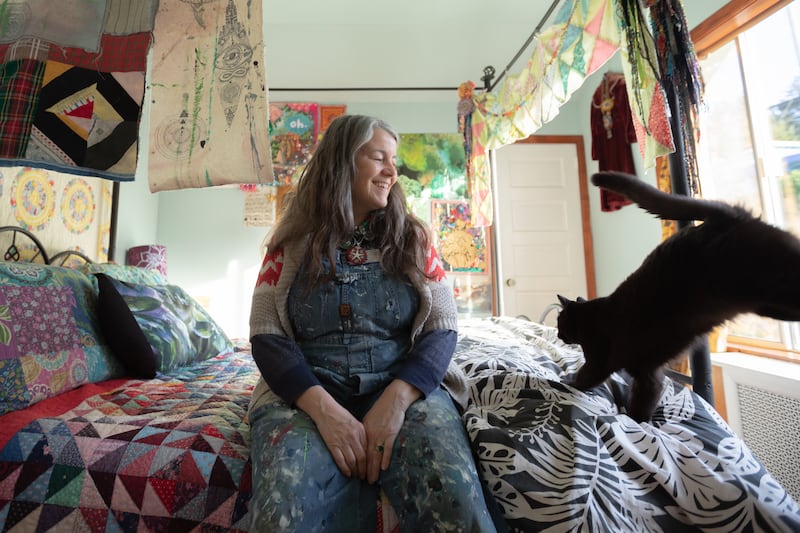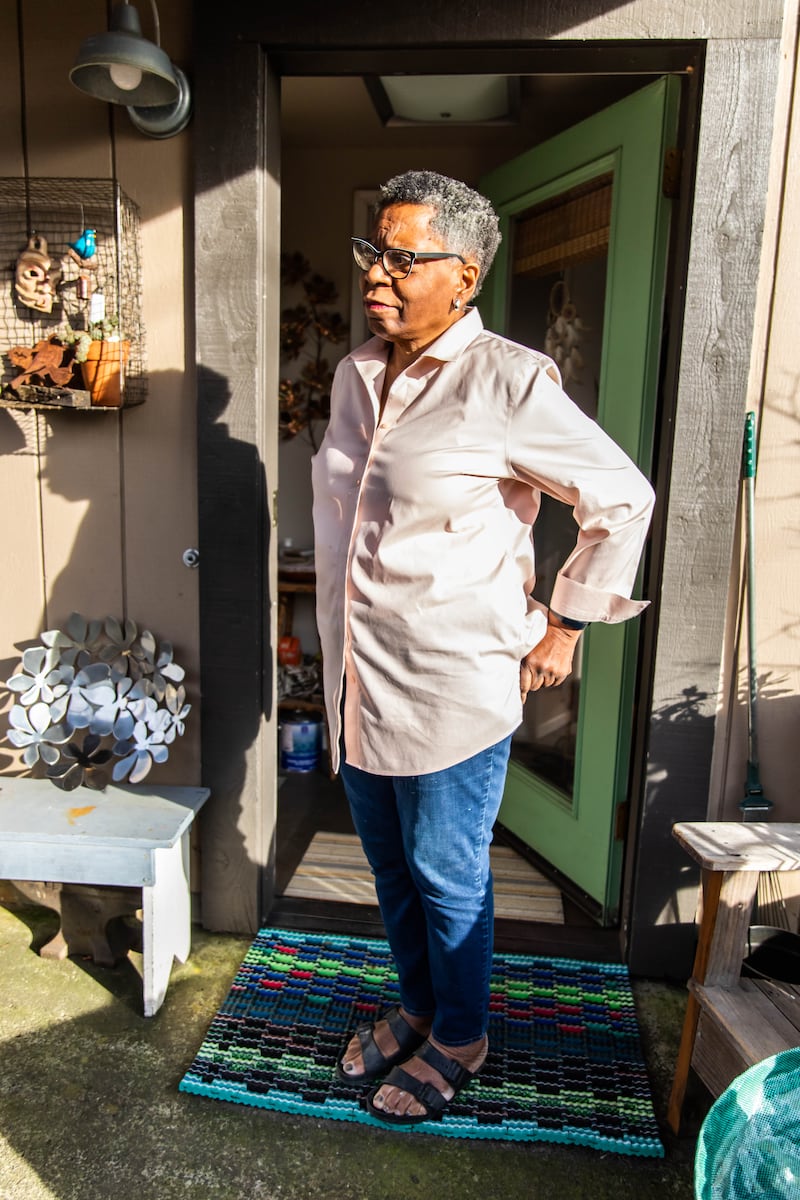The old saying is a conservative is a liberal who’s been mugged.
In Portland, many liberals are dodging stray bullets, losing catalytic converters to thieves, and sidestepping tents. Then they open their tax bills.
Maybe they aren’t voting Republican. But some are voting with their feet, getting the hell out of a city that once stole their hearts, driven away as taxes rise and quality of life declines.
Multnomah County has lost residents for the past three years, according to Portland State University’s Population Research Center. Before 2020, it hadn’t lost people since 1987, and that was just a one-year blip in an upward run that began in 1984.
In the most recent PSU estimate—for the year ended July 1, 2022—the population fell by 2,321. The cause was “out migration,” PSU says, which is a fancy way of saying people bailed.
That may not seem like a lot in a county that had 812,563 residents as of July 1, 2021, but it’s a reversal of fortune for a city that once attracted migrants from other states the way locally roasted Chemex coffee draws men with sleeve tattoos.
Josh Lehner, a state economist, says his department had expected a rebound in 2022, but it didn’t arrive. The longer the slump in population lasts, he says, the less likely pandemic-related moving patterns are to blame, and the more likely it is that Portland has a problem.
“Are we just a year off,” he asks, “or is there something fundamentally different?”
For some longtime Oregonians, the U-turn is hardly puzzling. Portland has switched from attracting new arrivals to repelling its current citizens—especially those with a few coins in their pockets and feet that start itching at tax time.
Stu Peterson, 65, grew up in Portland, and has been selling commercial real estate for decades as a partner at Macadam Forbes. He says the recent outflow of Portlanders with means is something new in his experience.
“I’ve never seen money move out of here,” Peterson says. “Nobody ever wanted to leave Oregon. It’s a beautiful place. Most evacuees are high-wage earners who are fed up with the crime, taxes and homelessness, in that order. There’s an ugly spiral.”
The exodus includes names with cachet in Portland’s most exclusive clubs.
Jordan Menashe, chief executive of homegrown Portland real estate firm Menashe Properties, left last year for Dallas. Marquee developer Mark Edlen also appears to have shifted his primary residence eastward: He canceled his Oregon voter registration last year.
In an interview, Edlen said he’d always planned to retire in Sun Valley, Idaho, where he lives now, but he still does most of his philanthropy in Oregon.
“The taxes are pretty close to the same,” Edlen says. “I haven’t done the math.”
The founders of Baker Ellis Asset Management LLC—Barnes Ellis and Brian Baker—packed up their money management firm and moved it across the Columbia River to Vancouver, Wash. Property records show that Ellis moved his residence north, too, buying a place in Ridgefield.
Ellis didn’t return calls seeking comment. Few upper-crust Portlanders would discuss moving. Some wealthy expatriates worry that Multnomah County or the Oregon Department of Revenue will pay special attention to their taxes on the way out, says one real estate broker, who declined to be named.
Regular folks were more willing to talk about their decisions to go.
In the past month, WW spoke with six people who have left or are preparing to leave Portland. All of them are upper middle class. Most of them described bittersweet feelings about departing a city that once drew them like a magnet, or even a lover.
But none of them had second thoughts.

Katie Schneider was one of them. She moved to the Woodlawn neighborhood of Northeast Portland in 2009, and says she quickly grew accustomed to the occasional sound of gunfire outside her house.
Then someone opened fire from a car on a summer evening in 2020, killing 22-year-old Jordan Lee Lewis on Dekum Street, just around the corner from her house and in front of Breakside Brewery, which her family frequented.
Seven months later, after putting her kids to bed, a car crashed in the intersection in front of her house. Her husband found a man, gut-shot and bleeding. Three parked cars had been struck, and police found 60 shell casings in the street.
In April 2021, two months after the car crash, they moved to a rented house in Vancouver, where she worked as a school counselor. Her husband, a bridge engineer, worked from home. A year and a half later, they moved to Anacortes.
Schneider wasn’t alone. “Our whole block moved within two years,” she says.
Schneider, 42, is a liberal who—still—loves Portland. But she couldn’t raise her family in a city where leaders don’t seem to have any solutions, despite having coffers full of taxpayers’ money.
“I don’t mind paying taxes, but I need to know that they are being put to good use,” Schneider says. “If they had been, I wouldn’t have had to move to a different state.”

Most of the people who spoke with WW were leaving for two reasons: high taxes and a growing sense of danger. Schneider spoke openly about the former, as did some others. All were eager to speak about the latter.
Lauren McCabe says she left in August 2021 mostly because her kids, now 8, 10 and 12, struggled with school closures during the pandemic. Her oldest attended Cathedral School in Northwest, where she says teachers sometimes hustled kids in from recess because nearby tents had caught fire, raising fears of toxins in the smoke.
McCabe, who voted for Barack Obama twice, then Hillary Clinton, had a number of unpleasant encounters. On one occasion, McCabe’s husband and son waited for the school’s gates to open, and a man sat down behind their car, shot up, and left the needle in the street. While walking to Salt & Straw on a date night, she and her husband were chased by a woman who was talking to herself.
McCabe and her husband are both chiropractors. Pandemic restrictions made it hard to operate, and new taxes squeezed their budget.
After 18 years in Oregon, McCabe, 43, decided it was time to go. She sold her practice and bought one in Naples, Fla.
“I didn’t think I was ever leaving Oregon,” McCabe says. But she did—as did some of her new neighbors on the Gulf Coast. “There are a handful of Oregonians who live near us. We share stories.”
Some Portlanders bristle when they hear about people leaving. Stephen Green, founder of PitchBlack, a competition for Black entrepreneurs, says the panic about Portland is overdone.
“We had a lot of people move here from 2008 to 2012 because we were No. 1 on this list or No. 1 on that list,” Green says. “They came here to consume the culture, not add to it. A lot of folks who are leaving were never committed. I’ll be here in 30 years.”
Others are wavering in that commitment. Developer Roslyn Hill grew up in Portland and bought her first commercial property on Northeast Alberta Street in 1991. She’s been committed to the neighborhood since, removing graffiti and picking up trash.
But she’s growing weary of the blight, and of paying taxes that don’t seem to pay for improvement. Recently, she returned home to find a man sitting on the bench in front of her house on North Lombard eating chicken, throwing the bones into her garden and charging his phone at one of her outdoor sockets.
Add the steady drip of new taxes, and it came to drive her mad, especially the new Preschool for All tax. “I paid for my own kids’ preschool,” Hill, 78, says. “I worked three jobs to do it.”
In August, she bought a duplex in Vancouver. She’s been fixing it up and hopes to move sometime soon.
“Paying taxes for issues that don’t seem to change how the city looks and feels is disappointing,” Hill says. “I like where I live. Portland is my home, but paying additional taxes with no improved outcome is hard.”

Starting in 2017, Multnomah County voters passed several tax measures aimed at improving life in their burgeoning city. After Metro and the county levied taxes to combat homelessness and provide preschool for all, Portland now has the second-highest total state and local income tax rate in the nation—14.69%—exceeded only by New York City at 14.78%, according to a report from Ernst & Young commissioned by Oregon Business & Industry.
That’s the top marginal tax rate, meaning you pay it only on income above $125,000 for individuals and $250,000 for married couples filing together. By comparison, the only New Yorkers paying the top rate there are those making $25 million or more, single or married. That means plenty of nonplutocrat Oregonians are paying taxes rivaled only by those levied on Gotham millionaires.
Unfortunately, just as taxes went up, quality of life went down. Way down. A record 101 homicides occurred in Portland last year, up from previous records of 92 in 2021 and 70 in 1987.
Thieves stole 11,000 cars in 2022, up from 9,000 a year before. Few walls are undecorated by graffiti. Even signs high over interstates are tagged. Unsheltered homelessness soared: The city says there are some 800 camps.
Stu Peterson and his cohort argue that people like Schneider who flee the bullets are canaries in the Stumptown coal mine and that we had better cut taxes soon, or else (see “Taxed Out of Town”).
Things are likely to get worse, too, they say, unless Portland voters come to their senses. In December, the state said activists had gathered enough signatures to put a measure on Multnomah County’s May 2023 ballot that would levy a 0.75% tax on capital gains to hire attorneys for tenants facing eviction.
Related: Portland’s new Main Street is in Lake Oswego.
Juan Carlos Ordóñez, communications director at the Oregon Center for Public Policy, says he doubts that taxes are driving meaningful numbers of people out of Portland. Oregonians voted to raise taxes on people making $250,000 or more in 2010, and the business community “went nuts,” Ordóñez says. But from 2010 to 2017, the number of Oregonians with at least $1 million in annual income jumped 133%, a 2019 report showed, the biggest jump in any state during that period.
“Taxes don’t cause people to leave,” Ordóñez says. “There is plenty of research showing this. And the state is better off having a strong tax system with a few rich people leaving than it is with a low tax rate and poor services.”
Before you say good riddance to the capitalists, however, remember that when a taxpayer leaves, they take their tax money with them. If things look bad now, they are likely to look a lot worse if there is less money for cops, firefighters, homeless shelters, and 911 services.

That’s what worries Erica Hetfeld. Until last year, she lived with her husband and 5-year-old daughter in a stately 1928 colonial in Eastmoreland, across the street from Reed College. She had a view of the iconic Old Dorm Block.
She also heard screaming on many nights. Once, during dinner, someone pounded on one of the windows. Another time, she discovered a purse in her hedge. She opened it and found a pair of baby shoes, a job application for a gas station, some art supplies, and a bunch of used needles with blood in them.
Hetfeld, 41, admits she might be more fearful than most. In October 1975, her aunt, Camille Foss, left work at Sears in Washington Square Mall to take a deposit at the bank. Police found her in the mall parking lot, shot twice. The murder remains unsolved.
Hetfeld reached her breaking point just before Thanksgiving in 2021. She was at work one afternoon, when the Ring camera at her house sent an alert. It showed a masked man carrying a box up to her back door. He rang, waited, then put the box back in the car and returned with rubber gloves on, carrying a painter’s pole.
The image on the camera went blue. The man had put masking tape over the lens.
Hetfeld called the cops. The man kicked in the door, and before the police arrived, he shook her jewelry box into a bag and grabbed their Sonos speakers. He plundered her daughter’s medicine chest and emptied her piggy bank.
She and her husband cleaned up the mess before their daughter came home, but when she asked what had happened to the door, they had to sugarcoat it. “It sucks when you have to lie to your kid about how safe the place you live is,” Hetfeld says.
They sold the house and moved to Lake Oswego five months later. Now, they live in a 1980s house that’s half the size but more expensive. But it’s worth it, she says.
“Now I’m worried about the squirrels instead of the junkies,” Hetfeld says. “We thought moving to the ‘burbs was going to be soul sucking, but it’s not, especially if you have a family.”
Hetfeld leans right. Maybe more than a little. She’s a Republican political strategist who has crafted ads thrashing former Gov. Kate Brown. On the website for her firm, Brass Tacks Public Affairs, she describes defeating a 2016 initiative that would have levied a 2.5% gross receipts tax on large corporations.
After the robbery, she went on the local Fox News affiliate to describe her ordeal.
“It’s totally unacceptable what leaders locally and at the state have done, which is to make it OK for people to commit crimes because they don’t feel like they are going to be put in jail,” she said on KPTV Fox 12. “We’re not safe here anymore.”
Real estate records suggest other wealthy Portlanders feel the same way. There is more demand for expensive houses in Clackamas County than in Multnomah. In the past 12 months, 47 houses sold for $2.5 million or more in Clackamas, compared with 37 in Multnomah, according to sales compiled by Inhabit Real Estate. Another 12 high-end homes sold in Washington County.
“Eighty-five percent of the people looking at these listings are trying to leave Multnomah County,” says Lake Oswego real estate agent Justin Harnish. “I was with a woman this morning who said she was moving out of downtown because she saw a lady stab another lady in the face with scissors.”

Not everyone who leaves Portland does so screaming in terror, or sounding like Ayn Rand. Some feel the allure of new places. The city’s woes just make it easier to leave.
Scott Crabtree, 56, moved to Portland in 1992, brought here by his girlfriend at the time. A native of Northampton, Mass., he was dazzled by the raw beauty of the place.
“I had friends tease me about my eyes spinning when I talked about Portland,” Crabtree says.
He worked in technology and, after about a decade, went to work at Intel in 2005, managing a group of engineers that worked with video game companies. He loved his job and he loved his city. Then, Central Oregon caught his eye. On one of their many visits to Sisters, his wife said: “This is my favorite place on earth.” On another, they were dazzled by the stars.
Portland, meantime, had been thrashed. Homeless camps were cropping up along routes that he biked. He was yelling at people to drive more slowly. Uptight by nature, he decided enough was enough and moved his family to Sisters in February 2021.
“There was a little bit of a push and a big pull,” Crabtree says.
As they mulled a move, Crabtree saw someone driving at 65 miles per hour or so down Stark Street. A week later, a pedestrian got killed near their house.
“That reinforced that this was the right decision,” Crabtree says.

Jenny Rideout, a drawing and textile artist who moved into the Alberta neighborhood in 1994, became similarly dazzled by another up-and-coming Oregon town: Astoria. It was last spring. Her daughter had gone off to college, and it seemed all her friends were talking about the place.
She became fixated. One day, her husband was walking down Alberta Street wearing a pirate’s hat (“as one does,” Rideout says). A man walked past and said, “You look like you’re heading to Astoria!” Rideout took it as a sign. They moved in September.
“It was a lightning bolt,” Rideout, 56, says.
Just as it had for Crabtree, Portland’s blight made Rideout more willing to leave. The sound of street racing on Martin Luther King Jr. Boulevard had become familiar ambient noise, along with gunfire. Fear of losing a catalytic converter kept her from going downtown to events.
In July 2021, she and her husband went to dinner at the Breakside Brewery on Northeast Dekum. She stepped outside to wait while her husband went to the restroom, and she heard the pop-pop-pop of gunfire. “I hit the deck,” she says. “Everybody went down.”
These days, Rideout plays “Meat Bingo” at the Workers Tavern in Astoria. One night, she won a roast, a chicken, some bacon, and $75. She and her husband go to free lectures on history and philosophy at the Fort George Brewery. And she’s doing more, bigger art. The only time she hears gunfire in Astoria is during hunting season.
Like Schneider and Crabtree, Rideout says she still loves Portland. All say they feel for the people who suffer more from the violence and property crime than they do.
“None of this gunfire was seeking me out,” Schneider says. “I’m a white person. We were not the demographic that was in danger. Maybe if we didn’t have kids, we’d still be there.”
But for all of them, the calculus changed. Their departures will change Portland, too.
